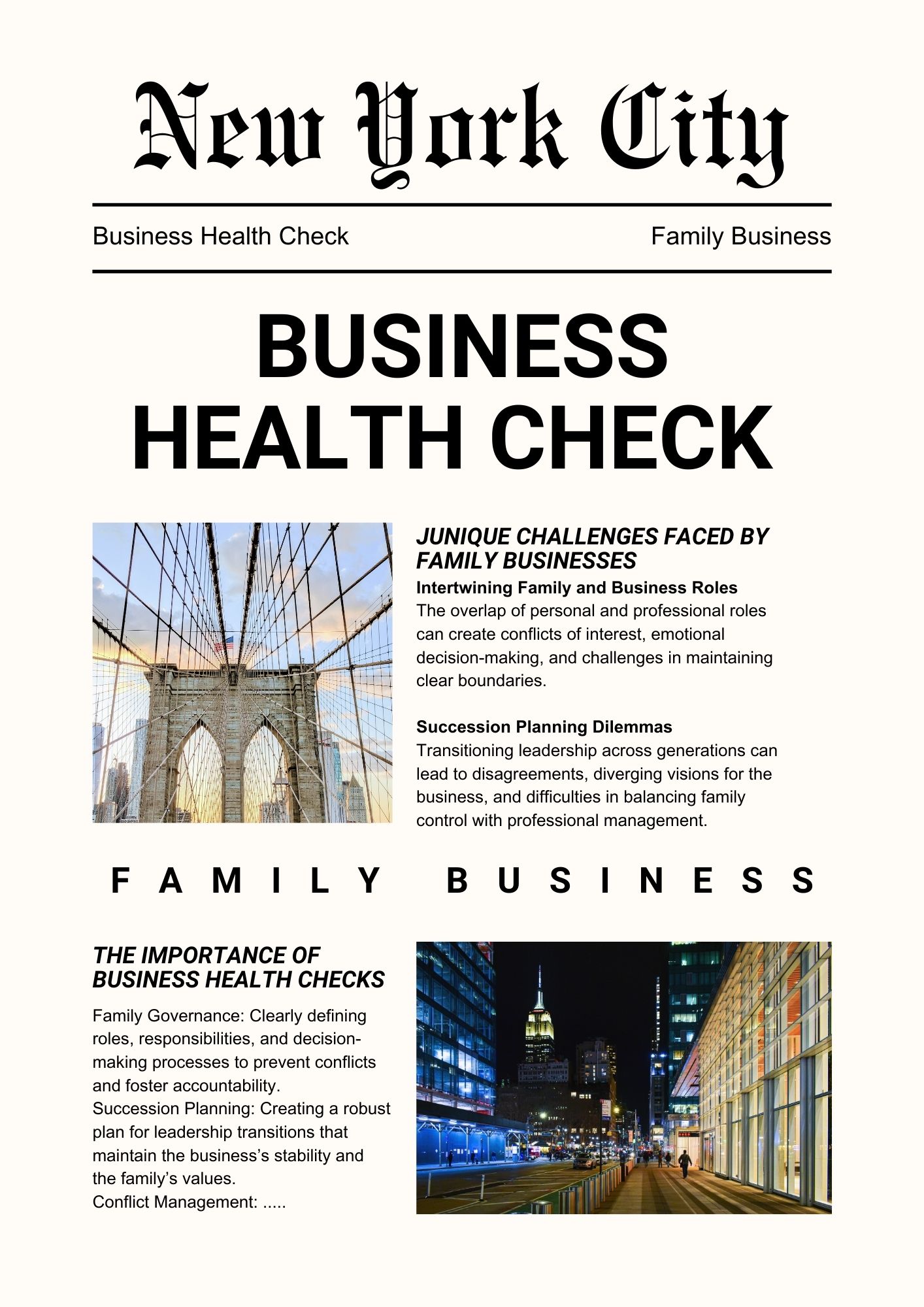Business Health Checks for Family Businesses: Addressing Unique Challenges and Ensuring Succession Success
Family businesses are the backbone of many economies, providing employment and preserving values across generations. However, they face unique challenges that require specialized attention to maintain longevity and competitiveness. Regular Business Health Checks (BHCs) can help family enterprises address these challenges, ensure smooth transitions, and sustain their legacy.
KEY POINTS
- Family Businesses Face Unique Challenges: The article highlights that family businesses have specific challenges related to governance, succession planning, financial management, innovation, and conflict resolution due to the intertwined nature of family and business relationships.
- BHCs Offer a Holistic Assessment: A BHC provides a comprehensive evaluation of the business, addressing not just financial performance, but also crucial areas like governance structures, succession plans, risk management, innovation strategies, and conflict resolution mechanisms.
- BHCs Ensure Longevity and Sustainability: By proactively addressing these challenges through regular BHCs, family businesses can strengthen their operations, facilitate smooth transitions between generations, adapt to changing markets, and ultimately ensure their long-term survival and success.
The Unique Challenges of Family Businesses
Unlike corporate entities, family businesses blend personal and professional relationships, creating distinct dynamics that impact decision-making and growth. Some of the key challenges include:
- Governance and Decision-Making: Balancing family influence with professional management can be difficult, leading to potential conflicts and inefficiencies.
- Succession Planning: Many family businesses struggle with leadership transitions, often lacking a clear roadmap for passing the reins to the next generation.
- Financial Stability: Emotional attachment to the business sometimes results in financial mismanagement, such as retaining unqualified family members in key positions.
- Innovation and Adaptation: Traditional mindsets can hinder the adoption of modern business strategies, making it difficult to compete in evolving markets.
- Conflict Resolution: Personal disputes can spill into business operations, affecting productivity and morale.
The Role of Business Health Checks in Family Enterprises
A comprehensive Business Health Check (BHC) evaluates the overall health of the business, ensuring that family enterprises remain resilient and future-ready. Here’s how BHCs help address key areas:
1. Strengthening Governance Structures
A structured governance model is crucial for sustainable family businesses. BHCs assess current governance practices, ensuring clear roles, responsibilities, and decision-making processes. Establishing an independent board of advisors can bring objectivity and strategic guidance, reducing conflicts caused by family biases.
2. Effective Succession Planning
One of the biggest risks for family businesses is the lack of a well-defined succession plan. A BHC identifies potential leadership gaps and recommends structured training programs for the next generation. It also helps establish transparent criteria for leadership selection, ensuring a smooth transition without internal discord.
3. Financial Health and Risk Management
A BHC provides a thorough financial analysis, highlighting areas that require better cash flow management, cost optimization, or external funding. It also helps identify risks related to over-dependence on family members, ensuring financial decisions align with long-term sustainability rather than emotional considerations.
4. Encouraging Innovation and Adaptation
Market trends change rapidly, and family businesses must evolve to stay competitive. A BHC assesses whether the business is leveraging digital transformation, customer insights, and market diversification strategies. It encourages a culture of innovation while preserving core family values.
5. Conflict Resolution Strategies
Personal relationships can complicate business operations. A BHC helps establish conflict resolution mechanisms such as family councils, mediation processes, and documented agreements to prevent disputes from affecting business performance.
Conclusion
Family businesses must go beyond tradition and actively assess their operational, financial, and leadership structures. A well-executed Business Health Check provides clarity on governance, succession, financial health, and innovation, ensuring that family enterprises thrive across generations. By proactively addressing these unique challenges, family businesses can create a sustainable legacy and achieve long-term success.









